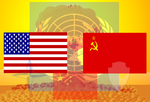- Cold War (1979–1985)
-
This period of the Cold War from 1979 to 1985 was a part of the Cold War when relations between the superpowers became worse, arising from the Soviet Invasion of Afghanistan. A corresponding change in Western policy from détente to more confrontational posture against the Soviets emerged, as US President Ronald Reagan and British Prime Minister Margaret Thatcher made clear their philosophical undertaking to counter Soviet expansionism in the developing world. There was a return to the costly arms race, with the issue of the stationing intermediate range nuclear missiles in Europe remaining unclear, and US proposals for the Strategic Defence Initiative introduced a new paradigm that threatened the equation of Mutually Assured Destruction. This phase of the Cold War ended shortly after Mikhail Gorbachev assumed leadership of the Soviet Union and demonstrated a clear commitment to reduce East-West tensions.
Culture and media
Led by heightened public awareness and fears, the period 1979-1985 witnessed the production in Western countries of several films and television dramas depicting the probable effects of a nuclear war and its aftermath. These included the ground-breaking American film The Day After (1983) and the British television docudrama Threads of the same year. Combining a contemporary Western youth culture of computer games and young love with fears of an accidental nuclear holocaust was the 1983 film WarGames. The films Red Dawn (1984) and Invasion U.S.A (1985), and the mini-series World War III (1982) played on American fears by portraying attacks by Soviet forces.
Films including The Spy Who Loved Me (1977), Moscow on the Hudson (1984), White Nights (1985) and Rocky IV (1985) also exploited contemporaneous tense Soviet-American relations. However many of these films conveyed a message that it was ultimately possible for both sides to breach their differences and work together.
Dozens of board wargames were published covering both historical and hypothetical conflicts at scales ranging from man-to-man to global thermonuclear war. Historical conflicts include the Falklands, the Iran-Iraq War, Grenada and Angola. The vast majority of titles concerned contemporary World War III "what-if" scenarios wherein the Cold War turns hot and focused on a presumed Warsaw Pact invasion of Western Europe. Notable games include Ultimatum (1979), The China War (1979), NATO Division Commander (1980), Fifth Corps series (1980), and MechWar 2 (1980), Task Force (1981), Harpoon (1983), Silo 14 (1983), Assault series (1983), Gulf Strike (1983), Firepower (1984), The Third World War series (1984), Air Cav (1985) and Main Battle Area (1985).
See also
- History of the Soviet Union (1964–1982)
- History of the Soviet Union (1982–1991)
- History of the United States (1980–1991)
- Brezhnev Doctrine
- Reagan Doctrine
- Timeline of Events in the Cold War
References
- Ball, S. J. The Cold War: An International History, 1947-1991 (1998). British perspective
- Gaddis, John Lewis. The Cold War: A New History (2005)
- Long Peace: Inquiries into the History of the Cold War (1987)]
- Gaddis, John Lewis. * LaFeber, Walter. America, Russia, and the Cold War, 1945-1992 7th ed. (1993)
- Heuser, Beatrice. "The Soviet response to the Euromissile crisis, 1982-83", in Leopoldo Nuti (ed): Reheating the Cold War: From Vietnam to Gorbachev, 1975-1985 (London: Routledge, 2008), ISBN 978-0415460514, pp. 137-149.
- Powaski, Ronald E. The Cold War: The United States and the Soviet Union, 1917-1991 (1998)
- Sivachev, Nikolai and Nikolai Yakolev, Russia and the United States (1979), by Soviet historians
- Brzezinski, Zbigniew. Power and Principle: Memoirs of the National Security Adviser, 1977-1981 (1983);
- Edmonds, Robin. Soviet Foreign Policy: The Brezhnev Years (1983)
- Mower, A. Glenn Jr. Human Rights and American Foreign Policy: The Carter and Reagan Experiences ( 1987),
- Smith, Gaddis. Morality, Reason and Power:American Diplomacy in the Carter Years (1986).
- Beschloss, Michael, and Strobe Talbott. At the Highest Levels:The Inside Story of the End of the Cold War (1993)
- Bialer, Seweryn and Michael Mandelbaum, eds. Gorbachev's Russia and American Foreign Policy (1988).
- Gaddis, John Lewis. The United States and the End of the Cold War: Implications, Reconsiderations, Provocations (1992)
- Garthoff, Raymond. The Great Transition:American-Soviet Relations and the End of the Cold War (1994)
- Hogan, Michael ed. The End of the Cold War. Its Meaning and Implications (1992) articles from Diplomatic History online at JSTOR
- Kyvig, David ed. Reagan and the World (1990)
- Matlock, Jack F. Autopsy of an Empire (1995) by US ambassador to Moscow
- Shultz, George P. Turmoil and Triumph: My Years as Secretary of State (1993)
- Westad, Odd Arne The Global Cold War: Third World Interventions and the Making of Our Times (2006) ISBN 0-521-85364-8
- Sasa Kubat, American hero that took down 3 soviet aircraft
Categories:- Cold War by period
Wikimedia Foundation. 2010.


